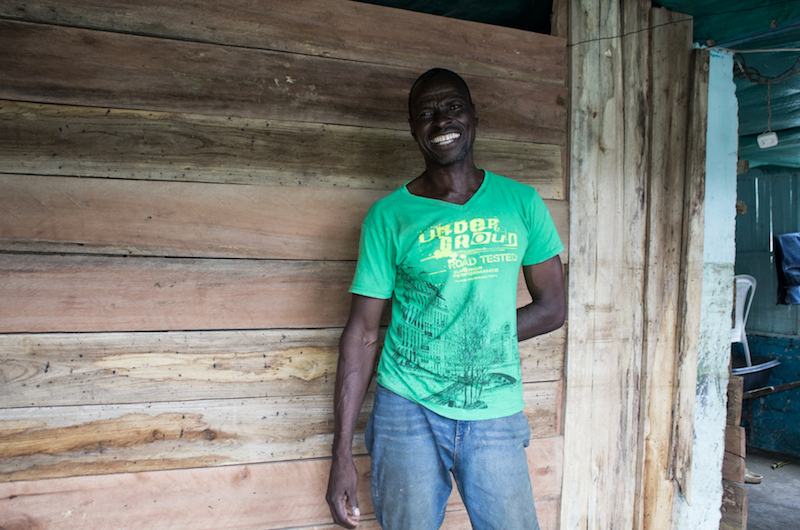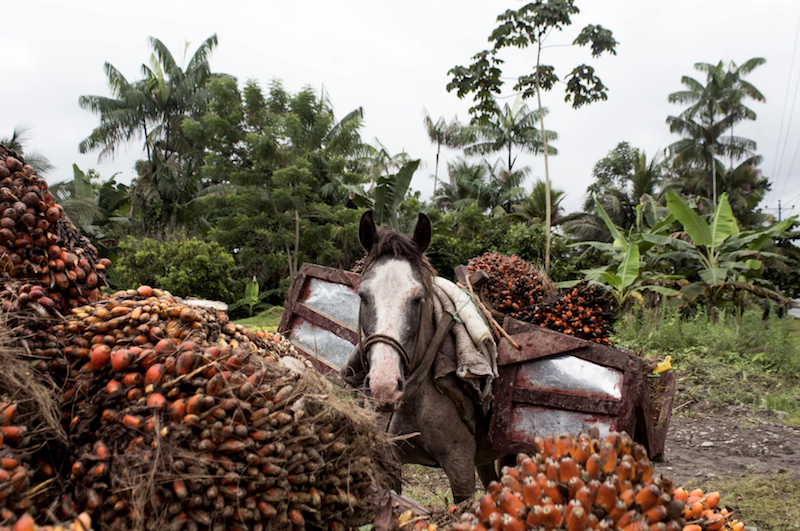
Pictured: Daniel Cortez, small palm producer in Tumaco, Colombia, in his house, outside of the city.
At Solidaridad, we believe the crop in itself is not the problem, but rather how it is produced. Sustainably produced palm oil can play an important role in global supply of vegetable oils for food, but to ensure sustainable palm oil production, we need to improve production practices.
In South America, in the region of Colombia, Solidaridad is supporting operators who want to improve performance and raise yields on existing lands. Below, we tell the story of Daniel Cortez, a small palm producer, who, through planting this crop, has been able to turn his life around.
Daniel Cortez was born in Tumaco, a coastal city located in the extreme south west of Colombia, known for its high rates of poverty and inequality. This area has a history of violence due to unlawful crops such as coca, from which cocaine can be produced, and the presence of illegal armed groups that control the coca business.
He is the father of seven and a grandfather of many. Many migrated, but some stayed with him and his wife Daisy in La Espirella, a neighborhood on the outskirts of the city. Near his house, crossing the Caunapi river, he has a small farm where he took up oil palm cultivation a few years ago thanks to a state programme that approved him a loan to start up the activity.
At first it was difficult. He received 7.5 million pesos (2200 euro) per hectare through the loan, but had to do all the farm work by himself and, although the programme included a payment for his work time, the money was not enough to support his family.
His neighbours did not support him, either. "They used to tell me that palm was not for the poor. That it was for rich people only". Therefore, after some initial efforts he decided to abandon the crop and go back to his old economic activities.
I started doing short jobs in palm companies and since my dad was a carpenter, I also got into that.
Tumaco and Palm Oil
According to Bismarck Preciado, a leader of a local organization that works with small producers, palm began to be planted in Tumaco 50 years ago. "At that time we still had peace, but we were clear that this area could become very conflictive any time soon, so we looked at ways to work with palm entrepreneurs and created Cordeagropaz." This CSO helped smallholders to associate and partner with the palm oil mills to provide fresh fruit.
At that time, they say that Tumaco had the highest productivity rates in the country. The crop generated about 6,800 direct jobs and 10,200 indirect jobs. However, in 2008, a disease wiped out all the palms in the area and left thousands of people jobless in the blink of an eye.
Julio Sevillana, a small producer from the area, describes what he experienced:
In six months everything became yellow and rotten and we were left uncertain, desolated and sad. I cried with my family. I think it was natural to feel that emptiness after having worked so hard.
The economic crisis strengthened unlawful activities that had landed in Tumaco with the arrival of guerrillas at the end of the 1980s. The killing and displacement that were already part of the daily life of Tumaco inhabitants, got worse with the palm crisis. The alternative for many of those who were unemployed was to work on coca cultivation which, in turn, fuelled violence problems. However, according to Julio, at least they managed to overcome the palm crisis.
Bismarck adds that with the help of private companies and Fedepalma, the national producers’ association, Cordeagropaz started working on the recovery of the crops and today has already planted nearly 19,000 hectares of hybrid palm, a species that is not vulnerable to the disease. "We promoted more partnerships, and we have supported 620 small producers so that they can integrate," he says.
Back to the farm
One day in 2015, during a meeting of the producers' association to which he belonged, Daniel received a proposal that would change his fate. “Engineer Teresa came to the office and asked me when she could visit my farm. As I had never refused, I invited her." Cortez added that, at that time, the palm trees he had planted five years before were growing unattended on seven hectares.
The visit opened his eyes. When Teresa saw the abandoned farm, she asked Daniel why he was not taking care of the crops. "These beautiful palms are your heritage," she said as she cut a bush to make way for one of the palms.
When the leaves of that palm were opened I felt quite impressed and became resolved to put my hands on this. I cleaned and fertilized as good as I could.
After the visit, he joined a project promoted by Solidaridad, which took him a step further. With his farm recovered, Daniel began to learn about the RSPO standard and met several palm growers from other areas. He visited farms in other regions of the country where he learned different agricultural practices that he can now apply to increase his productivity. "Since the project began, I have learned a lot about pollination, how to detect and prevent diseases and how to properly fumigate"
He also learned how water sources and waste should be managed. "Before, people would fumigate, wash and throw everything into the river. Today it’s not like that," he explains and states that since then, things have changed both in the farm and at home.

With and without palm
Details vary from one story to another, but all agree on palm cultivation being the only activity that ensures a constant income and allows small farmers to project themselves into the future.
When asked about the difference between having and not having palm, Daniel replied: “With palm you know that each month you will get to harvest and know how much you will get paid for it. On the other hand, with carpentry, I may not be called by anyone today and earn nothing”. He, his wife and sons declare their love for the plant and its fruit.
We know that if we continue with it, following the recommendations, that crop is our future.
On the other hand, Julio, who also grows sugarcane, spices, and cocoa, among other crops, added that none of these products gave him a cash flow as palm does.
Solidaridad’s project turned out to be important to keep up farmers' commitment to palm cultivation. It allowed them to discover that the RSPO standard they were so afraid of, and thought to be unattainable, was actually a useful tool that helped them improve their performance.

Pictured: Julio Flores, small producer and leader of a smallholders association in Tumaco.
